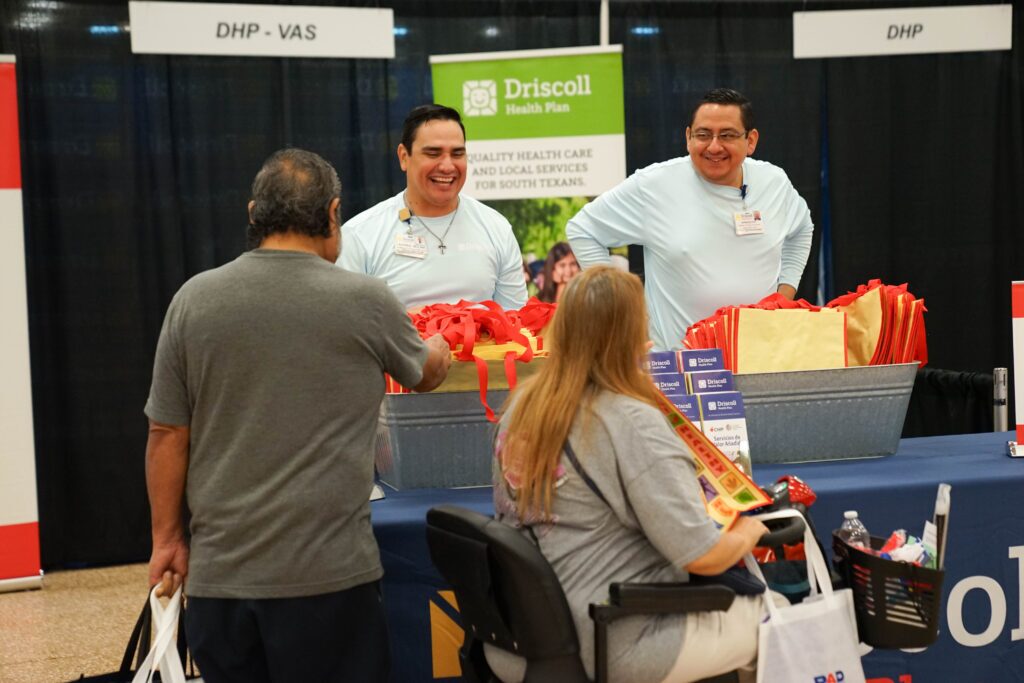Driscoll Health Plan: A lifeline for South Texas

People who know Driscoll Children’s Hospital understand that the care there is special.
That’s why it should come as no surprise that Driscoll’s Health Plan is special, too. Closely tied to South Texas communities and their needs, the nonprofit plan supports school districts, military families, local health care providers and more.
In this way, Driscoll Health Plan stands out from the rest. After all, the people who helped establish it also call South Texas home. They feel a strong duty to provide the best care possible to their neighbors, who are also their family and friends.
More than two decades since Driscoll made the bold choice to start a health plan, it’s still going strong today. This dedication makes the Health Plan more than just another insurance provider, it is a crucial part of the community’s well-being.
Commitment to local kids
Driscoll Health Plan finds needs and meets them with access to health care, making an impact that’s lifelong. This mission aligns with hospital founder Clara Driscoll’s vision to help all children, regardless of their family’s ability to pay.
In the 1990s, Driscoll Children’s Hospital made what Driscoll Executive Vice President and COO Dr. Mary Dale Peterson describes as “a bold decision.” Despite some opposition, the board chose to take a risk by creating a health plan aimed at providing insurance coverage for children.
According to Dr. Peterson, a strong commitment to improving children’s health drove the decision. While some other hospitals didn’t take the risk, Driscoll’s choice has led to better health outcomes for children and families in South Texas.

“People, especially children, who have health insurance coverage will access health care timelier and, hopefully, have better health outcomes and preventative care,” said Dr. Peterson, whoserved as Driscoll’s medical director, juggling the role with her duties as a pediatric anesthesiologist and intensivist. She became the president and CEO of the Health Plan when Texas expanded Medicaid managed care to the Nueces service area, which includes Corpus Christi.
“Medicaid was going to be different,” she recalled. “We’re dealing with a very high-needs population who struggle to make it through each day. Because of that, the state and federal government require us to do a lot more wraparound service.”
Driscoll Health Plan adopted the tagline “A Friend of the Family,” reflecting its mission to support families comprehensively.
Dr. Peterson explained the motivation behind this, saying, “The opportunity that this gave to me was really looking at some of the things that I think are sad that you see in a children’s hospital — children who come to a children’s hospital with preventable things.”
“What could we do better to prevent that from happening?”
Sights set on prevention
Driscoll Health Plan tackled high preterm birth rates in South Texas. “In 2007, our preterm birth rates were about 15.1%,” Dr. Peterson explained. “We realized we needed more education for our pregnant moms, understanding what a healthy pregnancy is and when it’s not going well.”
With state grants, they started an educational program and worked with OBs to improve adherence to guidelines. However, a key challenge was the lack of maternal fetal specialists in South Texas.
“Other parts of Texas already had maternal fetal specialists,” Dr. Peterson said. “We didn’t have them in South Texas. Driscoll didn’t deliver babies, but it was the right thing to do if we are responsible for ensuring the health and well-being of children in our communities.”
The Health Plan’s investments paid off. Before the pandemic in 2020, the preterm birth rate had dropped significantly — to about 9.1%. “Each one of these NICU admissions can become a catastrophic case,” Dr. Peterson explained. “If we can avoid those catastrophic cases, that infant has a better chance for a normal life. This not only alleviates suffering but also saves the state money.”
And while the Health Plan funded Driscoll’s Maternal Fetal Medicine clinics throughout South Texas, that’s just one way they’ve helped. The Health Plan has also helped with oral health, behavioral health and more.
“A lot of the issues that we see,” she said, “are very common in children and have simple solutions that are highly cost-effective.”
The best for Texas
Today, Craig Smith is CEO of Driscoll Health Plan. He explained that through their maternal fetal medicine investments, they are not only the top-performing health plan in achieving low rates of maternal mortality and improved birth outcomes, “We’ve also contributed significantly to the South Texas region setting the performance standard for the entire state.”
He credited Dr. Peterson for the program’s success. “It’s really a testament to Dr. Peterson’s work and our continued investment,” Smith said. “What started as an idea in 2007 has grown to become a $200 million investment transforming care across the region and state.”

Driscoll Health Plan’s approach goes beyond maternal care. Smith described their integration of behavioral health services into primary care. For example, when a child goes in for their regular checkup, a behavioral health specialist is now there as part of the visit.
“The approach of the Health Plan is wherever there’s a problem, let’s see if we can work with our health care partners to find a solution. We listen to the community and address their needs,” Smith said. “When pediatricians were overwhelmed with behavioral health cases, we stepped in to help. That’s what we do. Once you have committed people that are willing to make a change, a lot can happen.”
The Health Plan also runs a Positive Parenting Program (Triple P), which Smith said is especially useful and helpful to first-time parents and leverages the networks and connections throughout South Texas to raise awareness of key issues that affect children and families.
Driscoll Health Plan also collaborates extensively with community-based organizations, local governments, area school districts and more. Smith mentioned working with the Brownsville Police Department to help them develop engagement and communication strategies for young people with special needs like autism who may experience sensory overload from flashing lights and loud sirens. And in Laredo, they help fund a Promotoras program in conjunction with Texas A&M to train and deploy more community health workers in resource-poor areas.
Dr. Peterson and Smith both emphasized the importance of the Health Plan’s work.
“Without a nonprofit whose goal and mission are providing access to care, much of this access would disappear,” said Dr. Peterson.
But for Driscoll, that commitment runs deep. “For us, South Texas is home,” said Smith, “and with that comes an unequivocal responsibility and expectation that our neighbors, who are our family, who are our friends, deserve the very best in health care.”
Learn more about the Driscoll Health Plan by visiting driscollhealthplan.com.
